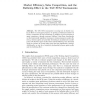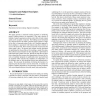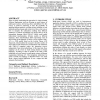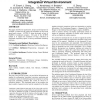ATAL
2006
Springer
14 years 4 months ago
2006
Springer
The modular representation of concerns is imperative in the design modeling of multi-agent systems (MASs). However, MAS designers typically face a number of concerns that inherent...
ATAL
2006
Springer
14 years 4 months ago
2006
Springer
The TAC SCM tournament is moving into its fourth year. In an effort to track agent progress, we present a benchmark market efficiency comparison for the tournament, in addition to ...
ATAL
2006
Springer
14 years 4 months ago
2006
Springer
ATAL
2006
Springer
14 years 4 months ago
2006
Springer
Notions of fairness have recently received increased attention in the context of resource allocation problems, pushed by diverse applications where not only pure utilitarian effic...
ATAL
2006
Springer
14 years 4 months ago
2006
Springer
This paper presents a statistical learning approach to predicting people's bidding behavior in negotiation. Our study consists of multiple 2-player negotiation scenarios wher...
ATAL
2006
Springer
14 years 4 months ago
2006
Springer
An agent's trust decision strategy consists of the agent's policies for making trust-related decisions, such as who to trust, how trustworthy to be, what reputations to ...
ATAL
2006
Springer
14 years 4 months ago
2006
Springer
The most natural way of thinking about negotiation is probably a situation whereby each of the parties involved initially make a proposal that is particularly beneficial to themse...
ATAL
2006
Springer
14 years 4 months ago
2006
Springer
There are many methodological approaches for Agent-Oriented Software Engineering, each one focusing on some features of multi-agent systems, but leaving others underdefined. For t...
ATAL
2006
Springer
14 years 4 months ago
2006
Springer
This paper describes the specification, design and development of ACTIVE, a testbed for the testing and simulation of large-scale agent-based systems. ACTIVE is being developed as...
ATAL
2006
Springer
14 years 4 months ago
2006
Springer
A major challenge in efficiently solving distributed resource allocation problems is to cope with the dynamic state changes that characterise such systems. An effective solution t...




